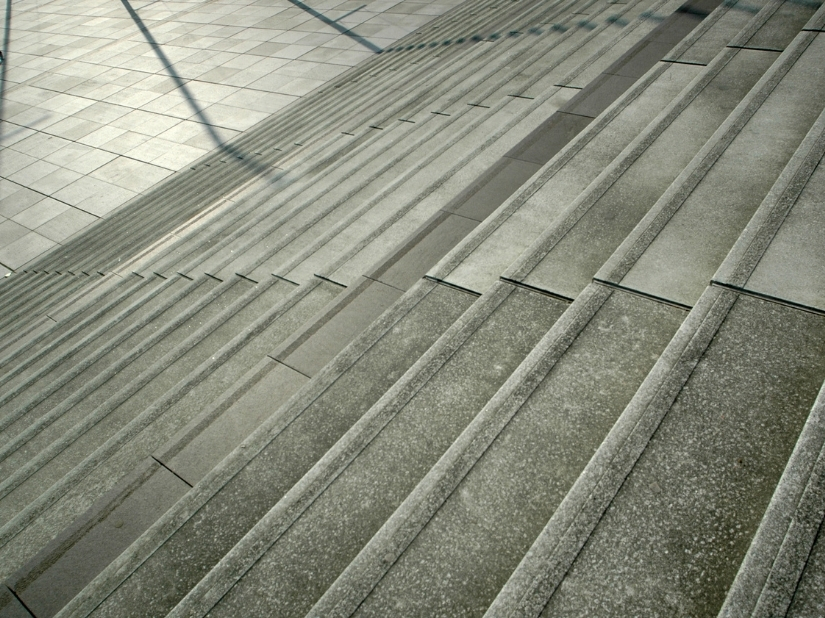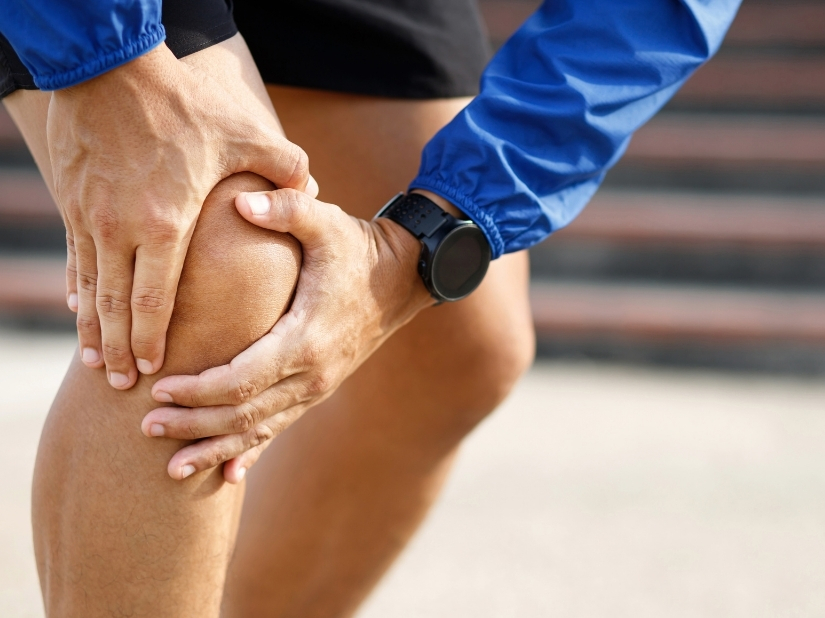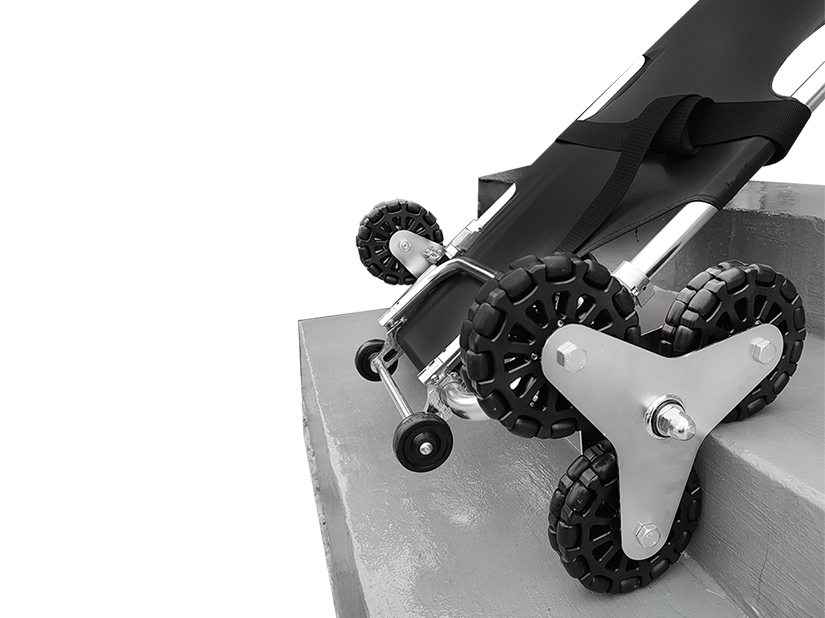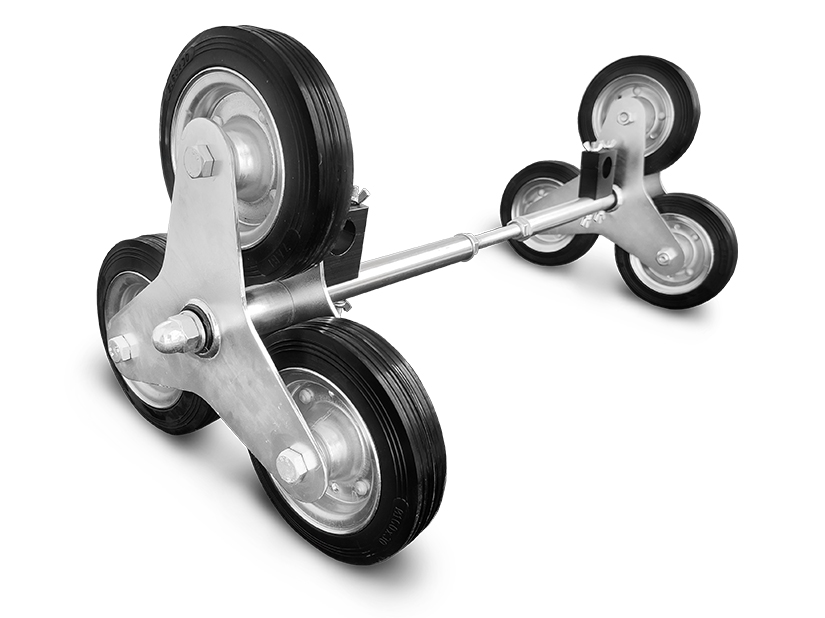Table of Contents
- Problems with Stretcher Transport Up Stairs – What Challenges Do Workers Face?
- Stretcher Wheels for Stairs – Key Benefits for Funeral Homes
- Stair Wheels for Stretchers – Practical Support for Transport Teams
- Multi-Directional Stair Wheels – A Modern Solution for Difficult Conditions
- How to Choose the Right Accessories for Stretcher Transport on Stairs?
- Practical Tips – How to Increase Safety and Comfort During Stretcher Transport on Stairs
- Why Invest in Modern Transport Solutions for Funeral Homes?
- Frequently Asked Questions (FAQ)
Transporting stretchers in funeral homes is a task that requires precision and the right tools, especially when it involves maneuvering up stairs. Staff face numerous challenges such as narrow spaces, steep steps, and the physical strain of carrying heavy loads. In these situations, specialized accessories like stair wheels and multi-directional wheels are invaluable. In this article, we discuss the challenges of stretcher transport up stairs and how specialized equipment impacts the comfort and safety of workers in this industry.
- Challenges of Stretcher Transport in Funeral Homes
Transporting stretchers is one of the most logistically difficult tasks faced by funeral home staff. When it involves moving up stairs, these challenges can become even greater.
In older buildings, where stairs are often narrow, winding, and steep, handling standard stretchers becomes a real test of workers' skills and physical strength. The risk of slipping, uneven weight distribution, fatigue, and the need for quick action are just some of the daily problems that can lead to dangerous situations.
From the perspective of funeral homes, safe and professional body transport is a crucial part of service quality. The lack of proper tools exposes staff to physical strain and the possibility of injury, which directly affects the quality of service provided.
That’s why investing in specialized accessories, such as stretchers with stair wheels, is critical. Introducing modern solutions allows for safer and more convenient transport, increases customer trust, and improves working conditions.

Problems with Stretcher Transport Up Stairs – What Challenges Do Workers Face?
Balance and Stability
Transporting a stretcher up stairs requires maintaining exceptional balance. Stairs are a difficult surface to maneuver on because shifting weight can easily destabilize the stretcher.
Instability can lead to uncontrolled movement, which is dangerous both for the people carrying the stretcher and for the person being transported. This risk can be minimized by using stair wheels, which reduce lateral movement and ensure stability on the steps.
Misfit of Standard Stretchers
Standard stretchers, often used in funeral homes, are not designed for stair transport. They are typically built for flat surfaces where maneuvering is not an issue.
However, stairs require equipment with the proper shape and stability to safely transport a body. Without specialized solutions, workers must use greater force and caution, which significantly burdens them physically.
Narrow and Steep Stairs
Many older buildings, where funeral services are often performed, feature specific, challenging conditions. Stairs can be narrow, steep, or winding, making transport not only difficult but risky.
Multi-directional stair wheels can significantly ease the task because they allow movement in tight spaces where every inch matters.
Physical Strain on Workers
Funeral home workers often work in conditions that demand physical strength, which can impact their health over time. Transporting stretchers up stairs adds extra strain, requiring staff to maintain full physical fitness and coordination.
Stretchers with proper wheels that facilitate weight distribution and increase stability can reduce this burden. As a result, the risk of injury and strain decreases, contributing to a more comfortable work environment.

Stretcher Wheels for Stairs – Key Benefits for Funeral Homes
Modern stretcher wheels for stairs address the transportation challenges faced by funeral homes. Investing in such accessories brings numerous benefits, including improved worker safety and enhanced service quality. The benefits include:
Work Efficiency: Specialized wheels reduce physical effort, making work faster and more efficient.
Worker Safety: Eliminating the risks associated with lifting heavy loads up stairs improves comfort and reduces the risk of injuries.
Professionalism and Reputation: A funeral home that prioritizes worker safety and customer service quality gains a strong reputation and stands out in the market.
Stair Wheels for Stretchers – Practical Support for Transport Teams
Stair wheels for stretchers are designed to aid stability and facilitate easier maneuvering up stairs. Specially designed stair wheels provide safety and ease of use, minimizing the risk of accidents and physical strain.
See the product: Stair wheels for stretchers
Benefits of stair wheels for stretchers:
- Stability on Uneven Surfaces: Wheels designed for stairs provide stable support, minimizing the risk of slipping.
- Ease of Maneuvering: Stair wheels make operating stretchers easier, particularly on narrow, winding stairs.
- Reduced Physical Strain: Stair wheels make transport less physically demanding, decreasing the risk of muscle and joint strain.
Multi-Directional Stair Wheels – A Modern Solution for Difficult Conditions
Multi-directional stair wheels are an innovative solution that provides greater mobility in areas with irregular surfaces.
In funeral homes, where transport occurs under diverse conditions, these wheels make it easy to avoid obstacles, turn, and maneuver without excessive effort.
See the product: Multi-directional stair wheels for stretchers
Key Benefits:
- Smooth Mobility: Multi-directional wheels allow for easy movement in tight spaces, making stair transport easier and safer.
- Versatility on Various Surfaces: Due to their design, multi-directional wheels are effective on both stairs and non-standard surfaces, offering greater flexibility in different locations.

How to Choose the Right Accessories for Stretcher Transport on Stairs?
Choosing the right accessories for stretcher transport on stairs depends on the specifics of the work and the environment where the funeral home operates. When selecting stair wheels, consider:
Type of Wheels: Standard wheels are suitable for straight stairs, but for winding stairs, multi-directional wheels are a better option.
Durability and Stability: The materials and construction of the wheels should ensure safe transport, regardless of stretcher weight.
Comparing Different Solutions:
Standard stair wheels are suitable for wide, straight stairs.
Multi-directional wheels should be used on winding or steep stairs where more flexibility is needed.
Practical Tips – How to Increase Safety and Comfort During Stretcher Transport on Stairs
Transport Techniques:
Maintaining Balance: Keeping balance during transport on stairs is key – transferring weight should be done carefully, controlling each movement.
Avoiding Abrupt Movements: Smooth, steady movements reduce the risk of losing balance.
Using Specialized Accessories: Utilizing stair and multi-directional wheels makes transport easier and safer.
The Role of Specialized Accessories:
Equipment like stair wheels and multi-directional wheels helps lighten the load for workers and ensures that even challenging tasks can be done quickly and safely. Thanks to these tools, funeral homes can guarantee the professionalism their customers expect.
Why Invest in Modern Transport Solutions for Funeral Homes?
Investing in specialized accessories like stair wheels or multi-directional wheels offers many benefits. High-quality transport improves the customer experience, impacting the funeral home’s reputation. Choosing modern solutions not only raises service standards but also enhances worker safety and comfort while minimizing the risk of injuries.
Frequently Asked Questions (FAQ)
1. Why is stretcher transport on stairs particularly difficult in funeral homes?
Stretcher transport on stairs is challenging due to limited space, steep stairs, and the heavy weight of the stretcher, requiring balance and the use of proper tools to ensure safety and worker comfort.
2. How do standard stair wheels differ from multi-directional stair wheels?
Standard stair wheels help stabilize movement on stairs, but they don’t offer the flexibility of multi-directional wheels, which allow for easier navigation around obstacles and maneuvering in tight spaces.

3. Is it worthwhile for a small funeral home to invest in stair wheels?
Yes, even for smaller funeral homes, investing in stair wheels offers measurable benefits, including improved worker safety, reduced injury risks, and better service quality for customers.
4. What are the main benefits of using stretchers equipped with stair wheels?
Benefits include increased stability, reduced physical strain for workers, easier maneuvering on stairs and tight spaces, and greater safety during transport.
5. Do multi-directional stair wheels work on all types of stairs?
Multi-directional wheels are more versatile and work on various types of stairs, though extra precautions may be necessary for very steep or winding stairs.
6. Does transporting stretchers with stair wheels require special training?
While stair wheels make maneuvering easier, staff should be trained in their use to ensure safe and efficient operation, particularly in challenging conditions.
7. What should you consider when choosing stair wheels for stretchers?
Consider factors like stability, durability, ease of installation, and the ability to maneuver in tight spaces when selecting stair wheels.
8. How do stair wheels impact workers’ health and safety?
Stair wheels reduce the physical strain involved in transporting stretchers, lowering the risk of injuries and muscle strains, contributing to long-term worker health and comfort.
9. Can stair wheels be used for transport on uneven outdoor terrain?
Most stair wheels are designed for indoor use on stairs, but some models are versatile enough to handle uneven outdoor surfaces.
10. What transport techniques are recommended to ensure maximum safety when moving stretchers on stairs?
It’s recommended to move smoothly, maintain balanced weight distribution, avoid sudden movements, and use specialized accessories like stair wheels to minimize the risk of accidents.




